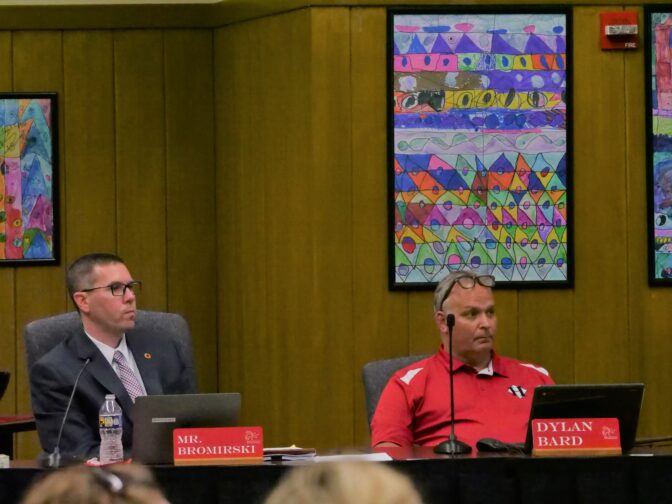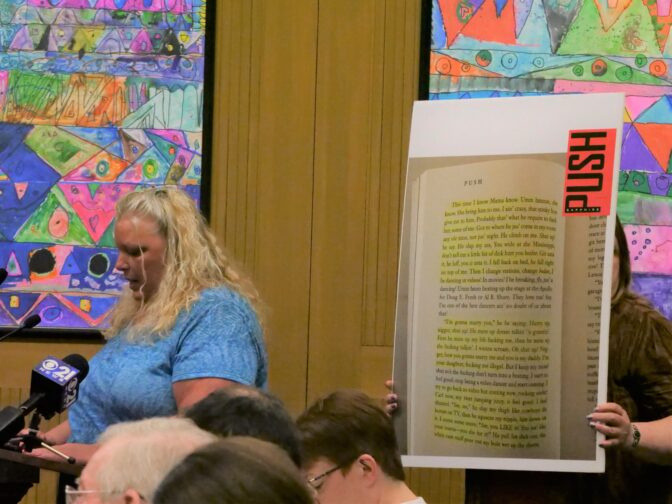
Over 100 people gathered in front of Hempfield School District's administrative building to rally against proposed policies to limit sexually explicit material in school libraries.
Gabriela Martinez / WITF

Over 100 people gathered in front of Hempfield School District's administrative building to rally against proposed policies to limit sexually explicit material in school libraries.
Gabriela Martinez / WITF

Gabriela Martinez / WITF
Over 100 people gathered in front of Hempfield School District's administrative building to rally against proposed policies to limit sexually explicit material in school libraries.
Scores of people packed a board meeting, arguing for and against policies designed to keep ‘sexually explicit’ books off the shelves.
The Hempfield school board in Lancaster County voted to advance policies that would make it easier to challenge library books and teacher resources. One would limit access to “sexually explicit” books in school libraries.
The board got around to voting on the policies on Wednesday after midnight after more than two hours of public comment that did not begin until 10 p.m.
It voted 7-2 in support of revisions to Policy 109 on “Resource Materials” in libraries. Those revisions include restrictions on sexualized content and other materials not considered “age-appropriate” for school age children.
The board also voted 7-2 to advance Policy 108.1 on “resource materials and other materials provided by educators” for a second reading. That policy would place more limits and scrutiny over additional resource material that teachers might use to supplement a lesson.
Board members Mike Donato and Jim Maurer voted against these proposals.
The board also approved a second reading for updates to Policy 105.1, which regulates how parents and guardians can review instructional materials, and for updates to Policy 105.2, which states that parents can seek exemption from instructions due to religious beliefs. The new changes to 105.2 specify that parents would be able to seek religious exemption from instruction on HIV/AIDS, religious literature, dating violence and dissection of animals.
Second reading of Policy 108.1 and 109 will happen at the board’s next meeting on June 13.
The updated Policy 109 states “sexually explicit content/material is not appropriate for school age children and this material will not be made available to students in our schools.” Sexual content is defined in the policy as “content/material that encourages an excessive interest in sexual matters and graphically describes/illustrates sexual behavior or acts of any kinds.”
Board President Dylan Bard said the board has heard concerns from community members about student access to sexually explicit books and materials in the library.

Gabriela Martinez / WITF
Hempfield School Board President Dylan Bard and District Superintendent Mike Bromirski.
“The board believes that the language we are voting on tonight strikes an important balance between these objectives,” Bard said in his prepared statement at the beginning of the meeting.
Jim Maurer, who also opposed the policy to limit how transgender students can compete in sports, spoke against the book policy before the vote, arguing the definitions of “sexually explicit” in the policy were too subjective.
“The policy, as it’s been rewritten, is not clear, and can be misconstrued based on the definitions that have been applied,” Maurer said. Because of that broad definition, Maurer said the board could have “the will to remove anything and so chooses.”
Donato echoed Maurer’s concerns, and said the policy could risk violating the students’ First Amendment rights. He said he supported an earlier version of the policy, but disagreed with the latest version.
“I would just like a more clear definition of what sexually explicit content material means that fits more on the line of what the courts are for this,” Donato said.
Two board members supporting restrictions on sexually explicit materials in schools, Bard, Justin Wolgemuth and Grant Keener, are running for reelection on May 16. In a candidate questionnaire published by the Pennsylvania Family Institute, a conservative Christian group, Wolgemuth said he strongly supports “policies that prevent sexually explicit and vivid sexual acts/descriptions being part of any curriculum or library.”
Parents, staff, and student council members filled the meeting room and overflow seating with a video monitor was set up outside.
Twenty-eight people signed up for public comment. Most spoke against the policies and expressed concerns about books being removed from the library.
At least six spoke in favor.
“This has nothing to do with banning books in the library, but usage of age-appropriate materials in our school,” said Stacy Hernandez, who identified herself as a parent of the district. “I’m not just talking about the library. I’m talking about in the classroom. My kids have brought home a good amount of assignments that have been inappropriate.”

“This has nothing to do with banning books in the library, but usage of age-appropriate materials in our school,” said Stacy Hernandez, who identified herself as a parent of the district.
Hernandez listed some examples of materials she considered inappropriate, which included reading assignments that delved into topics of rape and self-mutilation.
While Hernandez spoke, another person held up a poster of a blown- up passage from the book “Push” by Sapphire, a book that contains graphic descriptions of rape and incest. Hernandez, and other proponents of policies that establish guardrails on content that depicts sexual violence graphically, argue that such content could potentially retraumatize children who have experienced violence.
Other parents called out the board for crafting a policy that features a broad definition of “sexual content,” and argued that could make it easier to remove books.
Jennifer Augustine Lewis, who said she was speaking on behalf of 12 parents, said the Miller Test – the Supreme court’s method for determining whether speech can be labeled obscene – is already a standard for determining whether a resource should be in the library.
“Adding the words ‘excessive interest in sexual matters and graphically describing sexual behavior or acts of any kind,’ is subjective, unnecessary, and it’s overreach,” Lewis said.
Among the speakers were current and former students from the district. One was senior Ethan Lin, class president, who spoke about advanced placement curriculum courses high school students often take to earn credit for college.
“Spoiler alert: difficult discussions do happen at these classes, learning about things that make me uncomfortable. We talk about them in these classes. We listen to the professionals,” Lin said. “I don’t want other parents that are not professionals in this field to tell me what I can or cannot find in my school library.”
Others criticized the district’s relationship to the Independence Law Center, a Christian conservative legal firm. It helped craft the policy that limits transgender students’ participation in sports.
Bard told LNP the board met in executive session with Independence Law Center’s chief lawyer, Randall Wenger, after the board’s April 20 meeting. Policy 109 was discussed in that meeting, but it is unclear whether Wenger met with board members to discuss book policies.
The firm reviewed the Central Bucks School District’s policy that aims to keep material with sexual content out of its libraries, according to reporting by the Bucks Courier Times.
Before Tuesday’s meeting, more than 100 people gathered in front of the administrative building. Not all were district residents. The rally was organized by parents, including Jamie Beth Cohen, who pulled her children out of Hempfield because she believes the district failed to protect her children from COVID-19 and did not properly handle an incident involving an anti-semitic comment. More than 900 people have signed Cohen’s petition opposing district policies.

Minh-Thu Nguyen, a 2015 Hempfield grad, showed up to the protest and signed up to speak at the meeting. The transgender policy and the book issues drove Nguyen to get involved. She views those issues as intersectional, because, as a queer student who did not come from a supportive home, she felt the need to have access to books that discuss sexuality and gender in order to better understand herself.
“It’s about the intersection of a lot of things,” Nguyen said. “The weaponization of schools, the use of the school board’s prioritization of politics over people, which I think is kind of inhumane.”

Sometimes, your mornings are just too busy to catch the news beyond a headline or two. Don’t worry. The Morning Agenda has got your back. Each weekday morning, host Tim Lambert will keep you informed, amused, enlightened and up-to-date on what’s happening in central Pennsylvania and the rest of this great commonwealth.
The days of journalism’s one-way street of simply producing stories for the public have long been over. Now, it’s time to find better ways to interact with you and ensure we meet your high standards of what a credible media organization should be.